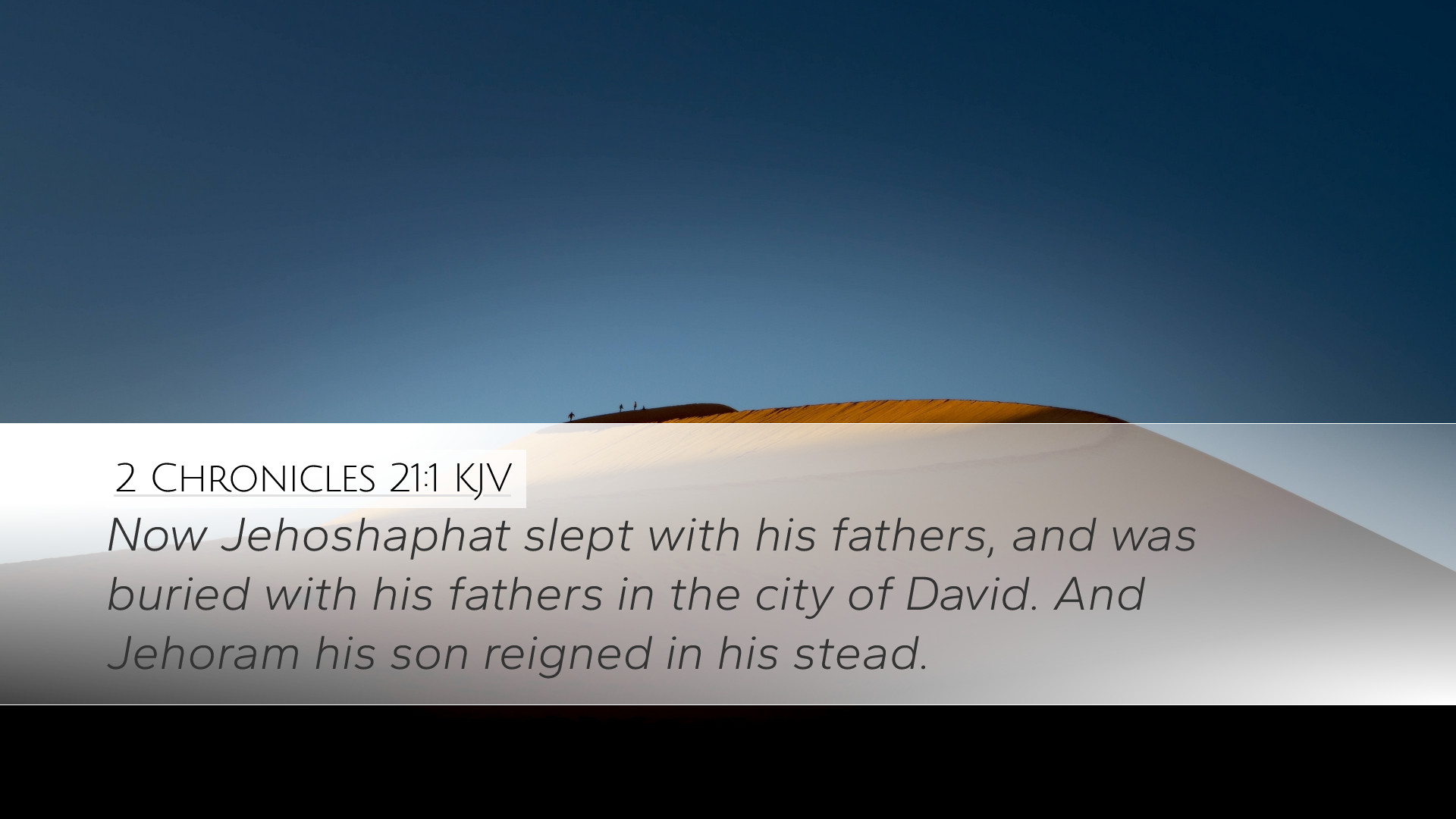Commentary on 2 Chronicles 21:1
Contextual Background: The history chronicled in 2 Chronicles focuses on the reigns of kings in Judah, particularly emphasizing their faithfulness to God and the consequences of their actions. Chapter 21 marks a pivotal moment with the ascension of Jehoram, son of Jehoshaphat, who set the stage for significant events that followed.
Verse Overview
2 Chronicles 21:1 states, “And Jehoshaphat slept with his fathers, and was buried with his fathers in the city of David: and Jehoram his son reigned in his stead.” This opening sets up the transition of power from Jehoshaphat, a relatively righteous king, to Jehoram, whose reign would be marked by turmoil and apostasy.
Commentary Insights
Matthew Henry's Commentary
Henry emphasizes the significance of the transition from Jehoshaphat to Jehoram as emblematic of a larger narrative regarding the faithfulness of the lineage of David. Jehoram is introduced with a name that serves as a foreshadowing of his future actions that stray from the righteous path established by his father.
He points to Jehoshaphat's righteous reign as foundational, illustrating how a king's legacy is crucial in determining the spiritual health of the nation. The phrase “slept with his fathers” denotes not only a physical death but also a passing on of responsibility. In this case, the weight of a legacy will soon contrast sharply with that of Jehoram.
Albert Barnes’ Notes
Barnes highlights the nature of Jehoram’s rise to power, noting that it is significant that the son of a godly king could so quickly descend into folly. He provides both historical context and theological reflection, observing that Jehoram's rule diverges sharply from that of his father, leading to greater insight into God’s judgment on Israel and Judah.
The act of burying Jehoshaphat in the "city of David" signifies the honor he received in death, contrasting sharply with the eventual fate of Jehoram, whose reign would be marked by brutality and idolatry. In Barnes’s view, this illustrates the truth that while external appearances of reign may be glorious, they ultimately reflect inward spiritual realities.
Adam Clarke’s Commentary
Clarke remarks on the genealogical transition, stressing the sobering inevitability of succession. He discusses Jehoram's qualifications or lack thereof, suggesting that despite being born into a lineage of faith, he failed to uphold the covenantal commitment expected of him.
Clarke also underscores the societal implications of Jehoram’s leadership, where his unfaithfulness would catalyze decay not only within the royal house but throughout the kingdom of Judah. The commentary reflects on the impact of leadership on communal faith, indicating that the personal spirituality of a ruler significantly determines the nation's collective spiritual trajectory.
Implications for Kingship and Leadership
This verse and the reflections drawn from the commentaries provide profound insights into themes of leadership, legacy, and spiritual integrity in governance.
- Legacy of Faith: The importance of a righteous legacy is underscored. Jehoshaphat’s impact on Judah is a testament to the power of godly leadership. Church leaders today must consider how their lives and choices influence those who follow.
- Apostasy and Consequences: Jehoram’s reign serves as a warning about the dangers of departing from faithfulness. The study of his character can prompt discussions around accountability and the dire consequences of leadership that strays from biblical foundations.
- God's Justice: The Succession from Jehoshaphat to Jehoram invites reflections on God’s justice. It serves as a reminder that even within a known lineage of faith, choices can lead to divine judgment, which is often seen throughout the historical narratives of the Bible.
Theological Reflections
For pastors and theologians, the exploration of this verse prompts critical reflection upon the dynamics of faith and leadership. It raises questions such as:
- How does spiritual integrity impact leadership practices in contemporary settings?
- What lessons can be drawn from the contrast between Jehoshaphat and Jehoram regarding the faithfulness of individuals in positions of power?
- How does this historical account inform current discussions on the relationship between church and state in matters of ethical leadership?
Conclusion
2 Chronicles 21:1 serves as a multifaceted entry point into discussions about kingship, accountability, spiritual legacy, and the trajectory of Israel's history. Drawing insights from Matthew Henry, Albert Barnes, and Adam Clarke, it is apparent that legacy and leadership are not just historical concerns but are profoundly applicable to modern theological discourse and pastoral practice.


